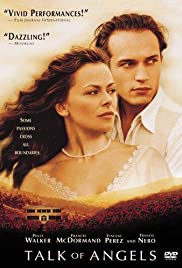
TALK OF ANGELS
UK, 1998, 96 minutes, Colour.
Polly Walker, Vincent Perez, Franco Nero, Frances Mc Dormand, Ruth Mc Cabe, Marisa Paredes, Francisco Rabal, Penelope Cruz, Ariadna Gil.
Directed by Nick Hamm.
Talk of Angels was written by celebrated Irish playwright and English professor, Frank Mc Guinness. It was directed by Nick Hamm, from Northern Ireland, who directed Martha, Meet Frank, Daniel and Laurence as well as The Hole and the Robert de Niro film, Godsend.
This film is set in Spain in early 1936, when Spain was on the verge of the civil war. It focuses on an Irish governess who goes away for a year to sort out her life and her relationships. She finds herself in the service of a wealthy family. The father, a kindly doctor, an idealist, is played genially by Franco Nero. Marisa Paredes (in Almodovar’s films like Flower of My Secret and All About My Mother) plays his aristocratic wife. There are three daughters including Penelope Cruz as the oldest daughter. The son is played by Vincent Perez, a politician who is on the side of the rebels and resigns his seat from the senate. Ariadna Gil is his ambitious wife. Veteran Spanish actor Francisco Rabal is a rather lecherous priest. In the meantime, there is a group of Irish unmarried women in the town, led by Ruth Mc Cabe as well as Frances Mc Dormand.
The film combines the background of the civil war along with political discussion and terrorism, there are also protest demonstrations put down by the police. There is also the portrait of the family itself and its divisions. There is also the romance as the governess finds herself attracted to the senator’s son.
The film recreates the period quite vividly with costumes and décor as well as beautiful Spanish scenery. It is one of the many films about the Spanish civil war – a Spanish version of this period appeared in the Oscar-winning La Belle Epoque, also with Penelope Cruz.
1.A blend of drama, history, romance? A perspective on the 20th century, the 1930s?
2.The title, the references, motifs, the mention of angels, the statuary in the churches?
3.Spain in 1936, the town, the countryside, the historic town and its buildings, the countryside and its beauty, the family mansion, the detail of life in the town, the atmosphere of impending war? The musical score?
4.The film as the story of Mary? Polly Walker’s presence? Irish, background, travelling to the family, her year away from Spain, her relationships, sorting herself out? The governess, arrival, the haughty mother and her accepting her? The more genial father? The three girls and their different attitudes? Settling in, the detail of her work, sharing the experience of the house, of the political background? The visit of Francisco and Beatriz, the edge and tension? The Irish women in the town, O’ Toole and her friendship, the friendship with Conlon (later revealed as Agatha)?
5.The family portrait, a family in the times, the father and his gentleness, a writer, his relationship with his children, idealist and dreamer, his despair, his work as a doctor, relationship with his wife, the daughters, his pride in Francisco? Helping Paolo when he was injured? Concealing him? The talk with Mary? His growing helplessness? Paolo’s death? The discussions with Francisco about his future? The mother, wealthy, haughty, her conservative beliefs, attitudes towards the governess, relying on Father Jorge and his opinions? Her wanting to get rid of Mary? The three daughters, Pilar, haughty, her expectations? Mila and her attention, devotion? The youngest daughter? Francisco, his meeting Mary, the attraction, love for her?
6.The character of the girls, Pilar as the oldest, glamour, spirited, dance, fashion, self-absorbed? Mila, open, learning, reading, the poetry, devotion to Mary? The youngest and her not learning English – her being present?
7.Francisco and Beatriz, Francisco as a senator, his resignation, the marriage and the childhood sweethearts, the background, his friendship with Paolo, Paolo’s being wounded? His clashes with his father, his new ideas? Return to Madrid? His encountering Mary, the dance in the square, people scandalised? The protest, his search for Mary, her search for him, their meeting, love for each other?
8.Don Jorge, his place in the household, gossip, touching the girls at the piano lessons, the father ousting him, his later meeting Mary, threats in the street, about the dancing, the strength of the church, threats?
9.The Irish women in the city, the reasons, O’ Toole, her strength of character, going to the shop – and later marrying the proprietor? Conlon, revealing her name as Agatha, her crush on Mary, stern, the talk, the walk, her personal declaration, Mary’s wanting to stay friends?
10.Beatriz, her ambitions, conservative, her treatment of Francisco, cold, in public, in private?
11.Paolo, coming to the door, his wounds, being tended by the doctor, his later death? A symbol of the fascist treatment of the revolutionaries?
12.1936, the two camps emerging, this being visualised, the military, the church, the fascist groups, the atmosphere, the demonstrations, the police attacking? The anti-fascist stances? Audience knowledge of the history of the civil war and its consequences with Franco?
13.How well did the film blend all these issues into one entertainment?